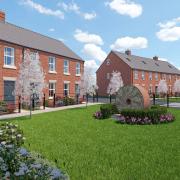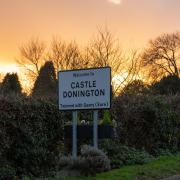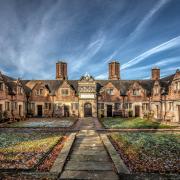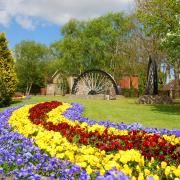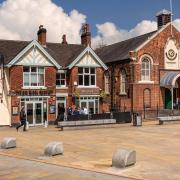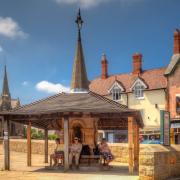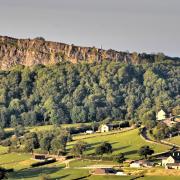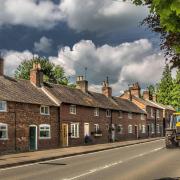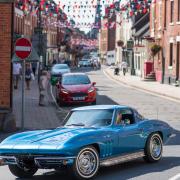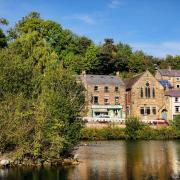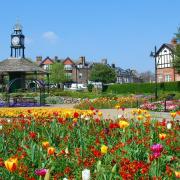In the villages of Scropton, Rolleston, Fauld and Egginton, Ashley Franklin discovers village charm, an equine heaven and a number of unique enterprises...

An assignment to explore the villages around Tutbury sent me driving into south west Derbyshire and across the borders of East Staffordshire. From here the north of our county feels far, far away as the contrast with the Peak District is pronounced. This is – as Roy Christian observed – ‘an essentially East Midlands landscape’ with rolling but low-lying countryside of rich grassland, a history of dairy farming, and fields enclosed by hedges rather than stone walls. There’s little stone in the buildings, too; here, it’s largely brick.
There is, though, a similar abundance of countryside to the Peak. Within moments of slipping away from either the A38 or A50, you find yourself in wide open spaces where fields seem to go on forever. I wasn’t surprised to find many equestrian-based businesses; after all, this is Meynell Hunt country. As Mike Goodwin of Holme Farm Equestrian Centre told me: ‘We have the best of both worlds here. We are surrounded by the peace and quiet of beautiful countryside yet we have easy access to excellent transport links.’
This area is a prime attraction for commuters and dormitory dwellers, although many villages are far from dormant: residents in Rolleston and Egginton spoke of a thriving community spirit and plenty of social activity. The area has also retained much of its rural charm. As one local hotel website states: ‘This area has a pastoral beauty scarcely known and barely touched by modern times.’ Martin Jones of Derby Aero Club in Egginton points out that nearly four million people reside within 30 miles of the airfield, yet Egginton resident Lisa Brown says her village is still a ‘small pastoral idyll’ where residents can pick up fresh eggs from the local farm.

Rolleston on Dove
The countryside opens up almost as soon as I slip off the A38 turn-off for Burton and head the opposite way towards Rolleston on Dove. On the left, in 60 acres of grounds, is The Blue Cross Animal Rehoming Centre, the first of several equestrian organisations I encountered. The horses here are of a particular kind: Blue Cross is a rescue centre, a charity taking in needy horses who have been abused, neglected or abandoned. Through the expertise of their handlers, they are rehabilitated, retrained and re-homed.
Opposite Blue Cross, tucked away at the end of a long drive, is Dovecliff Hall, an elegant Georgian House set in seven acres. The Orangery Restaurant is said to offer one of the finest dining experiences in East Staffordshire and it’s a popular wedding venue, too.

As I head into Rolleston, I recall my last visit was a fine dining experience at The Brookhouse. When I stop the car to gaze on this William and Mary Grade II listed house, it feels quiet. Alas, I discover that it has closed, with its future uncertain.
Rolleston itself feels quiet and quintessentially English as I step out to take in the babbling brook, scenic waterfall and handsome row of 300-year-old almshouses. Then I see Starbucks. Don’t worry, the American coffee chain hasn’t started moving into our villages just yet: this Starbucks is the local newsagent and post office, run by Andy Starbuck and his son Tom. Andy has been serving Rolleston for 20 years and has ‘loved every minute of it.’ It’s hard work, he adds, but ‘the customers are loyal, and the village a haven of peace and quiet.’
It’s far from sleepy, though: Rolleston is teeming with activity, not least at the Rolleston Club which opened in 1897 thanks to Sir Oswald Mosley, the fascist leader’s father whose family seat was at Rolleston Hall. Originally a general room where men could meet to play board games, cards and dominoes with a quiet room for reading, the Club is a licensed premises which now provides bowls, snooker, darts, dominoes, whist, bingo, and live entertainment. It’s also a meeting place for various groups.

Rolleston may be unique in the region as a village with a Choral Society – which has just celebrated 50 years – as well as an Engineering Society, where members gather in the Spread Eagle pub to hear talks on engineering topics. This society came out of something else possibly unique to Rolleston: the village’s Transport Festival, which has its seventh annual event on 25th May.
The festival itself arose from a discussion about cars, as founder John Morris recounts: ‘I was in the Rolleston Club talking about my beloved little sports car and we realised that quite a few of us had one.’ The next thing they knew, they had organised a gathering on the Green and 85 cars turned up. The event now attracts 2,500 visitors and packs in around 150 cars, including a splendid Rolls-Royce Phantom II, built in Derby and once owned by Sir Donald Campbell. It now belongs to Rolleston resident Jason Hunt who has the Rolls-Royce Wedding Cars business. The event also includes around 50 motorbikes, the odd steam wagon and lorry, and a vintage bus that ferries visitors around the village, as someone had the ingenious idea of holding car boot and garage sales on the same day. They number around 30.
The Transport Festival is a great village fundraiser, raising £3,000 last year for the Almshouse Trust, which needs £600,000 for vital restorative work. The six houses may look fine from the front but inside have no insulation or central heating. On the Almshouse Charity website page entitled ‘The Future’ are three simple words: ‘We need donations!’

Any village with a flower and vegetable show on its village green must be considered a ‘proper village’, so bravo Rolleston. It also majors in the Open Gardens scheme: 13 were open last year. Rolleston also has a florist, though not for much longer. After 20 years, working for and then owning The Florist Gate, Samantha Dolman is moving the shop to her home village of Anslow nearby. ‘Our village doesn’t have a shop,’ she points out, ‘so my family decided to create a farm shop alongside our florist business. We can benefit Anslow and I hope that my loyal customers will still come to me.’ I have a feeling they will. Just ask Parish Councillor Mike Robson who came to Rolleston in 2012 after 40 years in London: ‘This is a great place to live; everyone speaks to you and they go out of their way to make you feel welcome.’
Mike also urged me to visit the Jinnie Inn, run for the past four years by Sarah Barlea and her chef husband Adrian. The pub is a homecoming for Sarah whose family home backed on to the Jinnie Trail, a former railway line, now a nature walk.
‘Rolleston was a lovely place to grow up,’ recalls Sarah. ‘It was cosy, rural and safe, and it still is, really.’ Sarah adds that, ‘everybody knew everyone,’ which helped her business considerably early on as both current and former residents flocked to the Jinnie to renew old acquaintance. The Jinnie, she tells me, has become ‘both local hub and destination pub’, renowned for ‘service, atmosphere and ambience’ as well as ‘fresh, home-cooked pub food’ and live music. Spring and summer bring the added attraction of a large garden and a wood-burning pizza oven.

Tutbury and Fauld
I leave the Jinnie and head off for Fauld, driving through Tutbury with its wide range of niche retail attractions, many of which line its well preserved Georgian High Street. Here you find a ‘ceramics café’, exclusive clock shop, model railway stockist, chocolatier, traditional sweet emporium, gift shops, delicatessen, dress agency and hat hire centre. In keeping with the rural interests of the surrounding area it’s hardly surprising, too, to find a thriving branch of the Glenthorne Veterinary Practice.
The countryside feels even more open as I drive through Fauld to the hilltop village of Hanbury. This is prime walking country with no less than three circular walks from the Cock Inn, one of which takes you to the scene of Britain’s biggest explosion. Seventy years ago, 4,000 tonnes of bombs and ammunition were accidentally detonated at RAF Fauld’s munitions storage depot, killing 70 people. The huge crater left by the blast is still visible but filled with trees, shrubs and an abundance of wildlife, although off limits to ramblers in case of unexploded bombs.

Ironically, Fauld is home to Fireworks International, which started as a small shop in Derby and is now one of the biggest online retailers of pyrotechnics. There is also Woodhouse Farm, another rehabilitation centre for horses. Bennett Equine Care, run by Tim and Isla Bennett, treats and restores injured horses for their owners. Isla, a professional event rider of 20 years’ experience, set up this sports rehabilitation yard ‘as we were always frustrated that we could spend a fortune at the vets having them treated but then weren’t able to be constructive at home to further their recovery.’
Isla proudly showed me the aqua treadmill, which she hails as ‘the most perfect type of conditioning and rehabilitation for the equine athlete.’ In the manège, I saw Cash, a horse who came here after an operation on his back. ‘He was previously very unhappy to be ridden,’ says Isla, ‘but now has a good quality of life and, as you can see, is happily jumping again.’
Other equestrian businesses in these parts are Hargate, Barley Fields and Netherfield Stud, and Isla revealed that leading event and dressage rider Ruth Edge has recently set up Foston Stud.

Scropton
On the other side of the River Dove is Scropton where, strung out along Watery Lane, are two more equestrian businesses. Holme Farm is an equestrian centre that ‘develops riders and horses to their maximum potential.’ The trio of riders I met there were warm in their praise of co-founder and chief instructor Jo Freer, who has competed and won at a high level. ‘She is a highly qualified and charismatic teacher,’ affirms co-founder Mike Goodwin. ‘Jo and her fully qualified staff cater for everyone from total beginners to serious competitors, and we also have the expertise to develop not only riders but also horses.’
Holme Farm can also train customers in horse management so that they become independent horse owners – ‘and even when they do,’ says Mike, ‘many choose to remain with us because of our friendly, supportive atmosphere.’ Also very popular with members is the centre’s 60-acre woodland with its fords and jumps.
Next door to Holme Farm is another very individual equestrian centre, Scropton Riding for the Disabled. Founded 50 years ago by DRI physiotherapist Rosemary Gardiner, who initially took disabled children in to her Willington farm, this purpose built centre was the first of its kind in the country and possibly the world. I popped along on the morning my Down’s syndrome daughter Claire came with the Belper Whitemoor Centre adults for her weekly carriage ride. I could see from her beaming face that these rides are stimulating and therapeutic. As long-time Trustee Christine Marbrow says, ‘If the riders go away with a smile on their face, we have done something right,’ though she adds that some riders achieve such a high standard, they go on to compete against able-bodied riders, who are also taught at this centre. Some stay on as volunteers, a vital element in the continuation of this centre.
Scropton itself, like many of the villages hereabouts, is a small, unassuming set of dwellings with a church, though I did notice an attractive cottage trading as Vintage Pink, mainly an online business selling vintage gifts, crafts and home/garden wares, though it’s open on Saturdays when it also doubles as a tearooms.
Foston is a similarly modest, out-of-the-way settlement, though here is another handsome cottage with a thriving business. The Roundhouse, one of the country’s leading galleries for ceramic artists, has been run for the last 15 years by esteemed potter Philip Evans and his wife Leah.
Ironically, as Philip reveals, their Foston base brings in ‘zero footfall’ yet they have become a major destination gallery, with clients ‘beating a path to our door’, hungry to purchase the latest work by potters such as Chris Carter, Peter Beard, David and Margaret Frith, and John Maltby, whose last one-man show was a sell-out. A further Maltby show is planned for this summer.
Key to their success, says Philip, is ‘maintaining a wide selection of work with an emphasis on quality,’ adding that ‘modern studio pottery is quite affordable when compared with painting and sculpture.’ This has been aided by the fact that ten years ago the Roundhouse was awarded the Own Art scheme, which allows the cost of a piece to be spread interest-free.
Egginton
There are more attractive cottages as I head down to Egginton. Cherry Tree Cottages date back to 1815 when they were built for his estate workers by Sir Henry Every, 9th Bt. The current Sir Henry Every, 13th Bt, is still an incumbent in the village, marking four centuries of Everys in Egginton.
On a loop road, one resident stated that the village ‘stands on a road that comes from nowhere and goes to nowhere.’
‘This way we retain our quiet rural aspect,’ says Sir Henry. This aspect is enhanced by a quaint, squat-towered church which also has a delightfully-named Crinkle-Crankle Wall where fruit trees grow in the protection of the alcoves. The names Duck Street and Fishpond Lane point to a history of flooding. However, resident and parish council chairman Lisa Brown told me that a £9 million flood defence system, which took 12 years of lobbying, is now in place.
For a village without a pub or store, Lisa assures me that Egginton has a thriving sense of community, helped by a ‘state-of-the-art’ memorial hall used by many busy social groups. ‘Egginton has retained its charm and character,’ adds Lisa. ‘We have a lovely Norman church, medieval ridge and furrows, woods and a canal close by – with an aqueduct, too – plus a working farm. It’s a perfect mix of ancient and modern.’
Also close by is Derby Aero Club and Flying School, proud holders once of the Lennox Boyd Trophy, the nation’s top award for services to flying training. It’s a family business headed by Martin Jones whose son Paul, the Chief Flying Instructor, has amassed an impressive 14,000 hours of flying – ‘almost unsurpassed in the world of aviation,’ says Martin, ‘not even retiring long-haul airline pilots have that many hours!’
One of the beauties of this three-runway airfield is that it is outside controlled airspace, offering unrestricted access to flying. They also look after 150 aircraft – it is also an aircraft engineering centre – with over a dozen training aircraft on the fleet. It’s clearly thriving, membership is between 200 and 300 and there are plans for a working museum one day.
Another family business in Egginton is the cleverly-named Dog Father, a Kennel Club-accredited training school reckoned to be one of the finest in the country. Managing director and head trainer Zep Zizzi has a special reputation for his understanding of – and patience with – ‘problem dogs’, while Mo Lakin, who specialises in dog behaviour at the school, is a Kennel Club championship show judge, an accredited breeder and canine nutritionist.
As with so many businesses hereabouts, the access to good trunk roads is a major advantage and, given the rural aspect, this is clearly an appealing part of the world in which to reside. Radleigh Homes has embraced this area, and is busily building two, three and four bedroomed homes at Castle Green near Hatton. According to Sales Manager Natalie Griffiths, there are many positives about this place: ‘Here we have the countryside on the doorstep yet we’re close to schools, shops, pubs and restaurants. There’s also a thriving community nature reserve and pleasant bridleways and footpaths around. Castle Green is also within walking distance of the Nestlé factory which is undergoing investment of over £300 million. And when it comes to access, let’s not forget that as well as the main roads, East Midlands Airport is only 30 minutes away, and it’s quite close to Ashbourne, the gateway to the Peak. This is an ideal place to live.’




